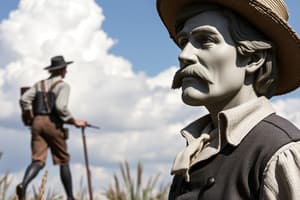Podcast
Questions and Answers
What is the name of the protagonist and narrator in 'Huckleberry Finn'?
What is the name of the protagonist and narrator in 'Huckleberry Finn'?
Huckleberry Finn
Which character is the sister of Widow Douglas?
Which character is the sister of Widow Douglas?
- Pap
- Judge Thatcher
- Miss Watson (correct)
- Tom Sawyer
Huck Finn introduces himself as a character from the previous novel, 'The Adventures of ______'.
Huck Finn introduces himself as a character from the previous novel, 'The Adventures of ______'.
Tom Sawyer
Huck feels comfortable living with Widow Douglas and complying with her expectations.
Huck feels comfortable living with Widow Douglas and complying with her expectations.
What event causes Huck to sneaks out of the window?
What event causes Huck to sneaks out of the window?
What does Huck think about Miss Watson's idea of the 'good place'?
What does Huck think about Miss Watson's idea of the 'good place'?
What superstitious object does Jim use to tell Huck's fortune?
What superstitious object does Jim use to tell Huck's fortune?
Which character represents a foil to Huck in terms of their adventurous imagination?
Which character represents a foil to Huck in terms of their adventurous imagination?
Huck enjoys going to school and has no issues with learning.
Huck enjoys going to school and has no issues with learning.
What does Huck do when he sees Pap's footprints in the snow?
What does Huck do when he sees Pap's footprints in the snow?
How does Pap react to Huck's education and mannerisms?
How does Pap react to Huck's education and mannerisms?
Flashcards are hidden until you start studying
Study Notes
Chapters 1-5 Overview
- Huckleberry Finn serves as the protagonist and narrator, reflecting a life shaped by societal expectations and personal freedom.
- The setting begins shortly after the events of "The Adventures of Tom Sawyer."
Chapter 1 Characters
- Huck Finn: Protagonist who struggles with civilizing influences from guardians.
- Widow Douglas: Huck's guardian, attempts to instill proper manners.
- Miss Watson: Widow's sister, represents strict societal norms.
- Tom Sawyer: Huck's adventurous best friend.
Chapter 1 Summary
- Huck reviews his previous fortune from hidden money, now worth $6,000.
- The Widow Douglas strives to 'civilize' Huck, leading to his feelings of loneliness and confinement.
- Huck's superstitious beliefs, like fearing bad luck after killing a spider, are highlighted.
- Huck sneaks out to meet Tom Sawyer, indicating his preference for adventure over civility.
Chapter 1 Analysis
- Twain uses a child narrator to create humor and critique societal hypocrisy.
- Huck’s innocent perspective clashes with the moral expectations imposed by Miss Watson and the Widow Douglas.
- The concept of 'the good place' as understood by Miss Watson is ridiculed through Huck's frankness.
- Demonstrates Twain's critique of Christian values that contradict the practice of slavery.
Chapters 2 and 3 New Characters
- Jim: Miss Watson's slave, embodies themes of superstition and humanity.
- Jo Harper and Ben Rogers: Friends involved in Tom and Huck's escapades.
- Tommy Barnes: The youngest member of their gang.
Chapters 2 and 3 Summary
- Huck and Tom's sneaking escapade leads to a comedic interaction with Jim.
- Tom plays pranks on Jim, illustrating the boys' mischief.
- The boys form a gang with imaginative plans influenced by adventure novels, lacking understanding of serious concepts like "ransom."
- They quickly tire of their 'robber' games due to their harmless nature.
Chapters 2 and 3 Analysis
- Jim's superstitions highlight societal beliefs and foreshadow deeper themes regarding slavery.
- Tom's romantic notions are contrasted with Huck's pragmatism, critiquing juvenile adventure literature.
- The Mississippi River symbolizes freedom and moral clarity, diverging from the corruption on land.
Chapters 4 and 5 New Characters
- Judge Thatcher: Manages Huck's finances but unable to protect him from Pap.
- Pap: Huck's abusive father, represents societal failure.
- New judge and his wife: Attempt to offer Pap support, but their efforts fail.
Chapters 4 and 5 Summary
- Huck adjusts to school and life under the Widow's care until the threat of his father's return arises.
- Fearful of losing his money to Pap, Huck seeks legal means to protect it, demonstrating his resourcefulness.
- Pap's jealousy and violence surface upon his return, emphasizing the theme of parental failure.
- The judge's attempts at reforming Pap illustrate the ineffectiveness of societal systems.
Chapters 4 and 5 Analysis
- Huck’s evolving relationship with education and civility is challenged by his father's abusive behavior.
- Superstition continues to play a significant role, with Huck's concerns reflecting childhood fears and societal beliefs.
- The complexities of Huck's relationship with money and familial ties underscore the struggle against oppressive influences.
Studying That Suits You
Use AI to generate personalized quizzes and flashcards to suit your learning preferences.




